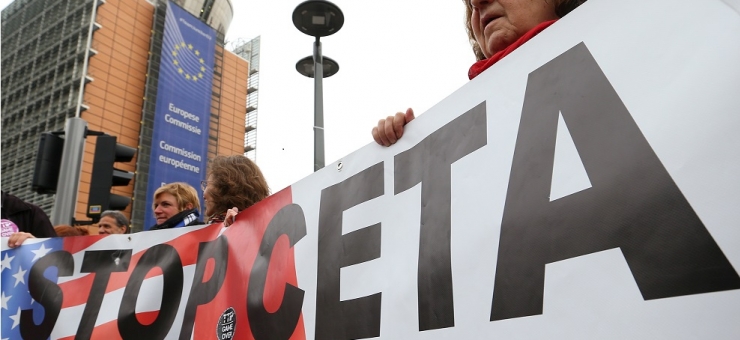News
The CETA compromise

Nyon, 28-10-16
This week has seen a dramatic playoff between the Belgian region of Wallonia and the rest of the EU, as Wallonia initially denied to sign CETA – the Comprehensive Economic and Trade Agreement between Canada and the EU. As media houses and politicians from across the political spectrum lashed out to Wallonia blaming them for taking democracy hostage, negotiations began between Wallonia and the EU. Sentiments ran high as the millions of citizens who already had demonstrated against CETA and TTIP urged Paul Magnette to stand strong.
Yesterday, it was announced that the five regions of Belgium had reached an internal compromise allowing Belgium to sign CETA. Tweets, emails and phone calls have provided us with some insight into what Belgium demands for its signature. Comparing to Wallonia’s original list of demands, one of which was a demand for enforceable labour rights, the compromise addendum falls short on several counts. But, Wallonia has got a very important demand through, namely that the European Court of Justice (ECJ) must rule on the compatibility of the investor-state settlement (ICS) system with the European Treaties. In addition, some regions maintain that they will veto the final deal if the chapter on investment protection is not improved by the time of the final ratification.
As published in the Belgian press, the addendum to CETA can be read here in French and Dutch. Our English translation can be found on this link . If we assume the correctness of this information, Belgian has, in addition to the requirement of an ECJ ruling, managed to pass four changes:
- A guarantee that ICS will have professional judges in the EU and in Canada
- That access to this jurisdiction will be accessible for Small and Medium-sized Enterprises (SMEs)
- And that care services and social insurances (mutualities, etc.. ) are excluded from CETA
- A safeguard measure for farmers so Wallonia can support the sector in crisis times.
It is expected that by midnight tonight, each EU member state will have signed the deal.
General Secretary Philip Jennings comments: “We celebrate the Wallonian government’s bravery in defending their red lines. That a compromise was found is not surprising, nor unexpected. They have been under enormous pressure.”
UNI Europa Regional Secretary, Oliver Roethig adds: “From UNIs perspective, the CETA deal still leaves a lot to be desired. Although slight changes have been made to ICS, ICS as such remains in CETA. Labour standards are still not enforceable. Regulatory cooperation that gives companies a say over draft regulation before anybody else, is still in the agreement.”
The ETUC and CLC ask in a joint statement issued today the European Commission, the Canadian Government, and the EU Member States to open the negotiations to democratic consultation of trade unions and civil society, in order to ensure the necessary changes are introduced to address existing concerns, as a trigger for a fair and progressive agenda for trade agreements at global level. Roethig explains: “CETA needs to be re-opened and renegotiated. CETA could become the model trade agreement that all other trade agreements build on. But this requires a rethink and far more ambitious goals for workers, for environmental sustainability and for citizens.”
CETA has been called TTIP through the back-door. It opens markets for liberalisation and privatisation, and although politicians claim that their ‘right to regulate’ is maintained, nothing in CETA says that that very regulation cannot be subject to multi-million euro settlements through the ICS. Settlements which many fear will lead to a regulatory chill as governments shy away from regulating in the public interest to avoid costly settlements.
With CETA near conclusion, our attention, activities and demands must now be directed towards the 50 countries involved in TiSA.

